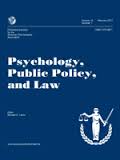 Noncompliant participant behaviors in Mental Health Courts have the strongest impact on failure-to-graduate, which eliminates the mitigating effects of MHCs on risk to reoffend. This is the bottom line of a recently published article in Psychology, Public Policy, and Law. Below is a summary of the research and findings as well as a translation of this research into practice.
Noncompliant participant behaviors in Mental Health Courts have the strongest impact on failure-to-graduate, which eliminates the mitigating effects of MHCs on risk to reoffend. This is the bottom line of a recently published article in Psychology, Public Policy, and Law. Below is a summary of the research and findings as well as a translation of this research into practice.
Featured Article | Psychology, Public Policy, and Law | 2014, Vol. 20, No. 2, 191-199
Predictors of Mental Health Court Graduation
Author
Abstract
Mental health courts (MHCs), nontraditional problem-solving courts designed to address underlying causes of offending rather than apportion guilt and punishment, have been reported to reduce offending among persons with mental illness and consequently have been spreading. Graduation from a MHC has been found to be a major predictor of reduced recidivism; yet few studies have examined factors affecting MHC graduation. This study examines what participants brought to MHC, their processing in MHC, and their behaviors during MHC. It found that noncompliant participant behaviors during MHC had the strongest impact on graduation, increasing the odds of failure to graduate and reducing, if not eliminating, the direct effects on completion of the risk factors participants brought into court.
Keywords
co-occurring substance abuse, diversion, graduation, mental health courts, severe mental illness
Summary of the Research
Data were analyzed for all individuals who participated in the first 2 years of operation of a large metropolitan pre-adjudication Mental Health Court (MHC) in the United States to determine those variables most strongly associated with successful completion (graduation).
The MHC “accepts competent severely mentally ill arrestees charged with misdemeanors who have no pending violent felony charge and have had no violent felony conviction in the past 5 years. This MHC is relatively short term, monitoring participants for treatment and behavior compliance at monthly status hearings from 4 to 6 months (in contrast to a year or more in most MHCs)” (p. 192).
Prior research examined the impact of this MHC on criminal recidivism one year after exit for both graduates and non-completers and found that although both graduates and non-completers had reduced offending following MHC participation, it was the graduates who were responsible for the recidivism differences between MHC participants and a comparison group.
The current study compared graduates and non-completers with respect to three types of variables—characteristics with which participants enter MHC (sociodemographic and recent criminal history), court processing variables, and measures of participant behaviors during MHC—using both bivariate and multivariate models.
The results indicated that “participant behaviors during MHC, measured by arrest, failure to appear for MHC hearings, positive drug tests, and noncompliance as recorded by case managers, negatively affected graduation and significantly increased explained variance in multivariate models when other relevant variables were controlled…measures capturing failure to change past behavior patterns and not following court mandates had a larger impact on graduation than [sociodemographic and recent criminal history]” (p. 196).
The strongest of the four participant noncompliance behaviors impacting MHC outcome was the positive drug test ratio (ratio of positive drug tests to the total number of drug tests administered).
“Persistent failure to make behavior changes and to cooperate with court mandates was most closely associated with termination. [However,] enough high-risk participants complied with the MHC program and changed to law-abiding behaviors so that participant behavior in MHC overrode part patterns of drug use and prior offending in the statistical models” (p. 196).
“The importance to successful MHC completion of participants changing their behavior to comply with court mandates was also found by Redlich and colleagues (2010, 2013). This finding of participant behavior during MHC overriding demographic and criminal history predictors should not be taken to mean that past risky behavior patterns are unimportant because both [this] study and that of Redlich and colleagues (2010) found that these earlier behavior patterns predict compliance during MHC. In other words, criminal history factors influence participant behavior during MHC but the MHC program counteracts those earlier influences to bring about changed behavior with a substantial proportion of participants to override their effects in predicting graduation” (pp. 196-197)
Translating Research into Practice
The results indicate “that a significant proportion of participants overcame the risk factors of their past and changed their behavior from prior behavior patterns (multiple prior arrests and drug use) with the structure and supports of MHC.”
These results have important implications for MHC screening procedures as they “suggest that mentally ill persons with high risk factors should not be denied admission to MHC, as many such persons are capable of responding with changed behavior patterns to a well-structured and resourced program” (p. 196).
Although these researchers found that “the risk factor of drug abuse led to termination, it did not preclude graduation. [Further,] graduates averaged 2.5 positive drug tests during their time in MHC, indicating that a sizeable proportion of drug abusers managed to change their behavior and cease their drug abuse, at least during MHC. Again, [these] findings suggest that higher risk offenders (those with substance abuse) are viable candidates for MHC admission in that a MHC program with treatment, services, monitoring, and supports that address substance abuse as well as mental illness can assist them to new law-abiding behavior patterns” (p. 197).
Join the Discussion
As always, please join the discussion below if you have thoughts or comments to add!






















